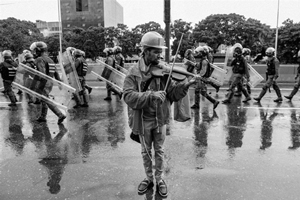Authored by Miki Pannell

One might wonder how it is possible that a country, that has democratically elected the same government for over twenty years, has ‘all of a sudden’ gone into a hyper-inflationary economic death spiral. Just how much is old-school neoliberal fake news? And which factors have contributed to its malaise?
First off, (hyper)inflation is, and always has been, common currency in Latin America, if you’ll pardon the pun. Every Latin America nation has a long, time-honoured history of currency debasement – the famed ‘race to the bottom’ – with countries using money-printing to either paper over economic cracks, or as a kind of stealth tax on the population. The continent has seen mammoth debasement in Argentina and Bolivia (to name but two) resulting in currencies being rendered worthless. Not just once, but time and time again. Even the more prudent Hispanic central banks have undertaken sustained assaults on their own currencies. Chile for example, often touted as the free market paragon, still had inflation running at 9% in 2008, even when it was the neoliberal flavour of the month. Ecuador’s inflation as recently as 2000 was a giddy 95%. Venezuela itself, even before Chavez and Maduro, had seen inflation in triple figures on numerous occasions.
The damage caused to anyone with savings, annuities or pensions in such an environment is obvious. Yet even with the most moderate inflation in Latin America, the consequences are devastating.
Let's put it into perspective. Many of the continent's least inflationary figures are comparable to the numbers from the UK during the 1971-81 period. In Britain you might remember your life savings and purchasing power being completely decimated with CPI inflation running into double figures on eight out of ten years, peaking at 25% in 1975. Now, imagine those kinds of figures as the more desirable end of Latin America’s inflation spectrum and you’ll begin to understand just what we are dealing with.
Latin countries that haven’t experienced the total currency collapses of say, Argentina, Bolivia or Venezuela, have, nevertheless, almost all been ongoing victims of ubiquitous money printing and gnawing inflation. The smarter folk took precautions: businesses avoided cash, families invested hard assets such as jewellery and, more recently, there has been a rush to cryptocurrencies as a store of value. Historically extreme inflation has had relatively limited effects given that for most of last century, Latin American countries barely had a middle class and were formed by 5% or less elites. The remaining 95% were for the most part without bank accounts, passports or any ability to save.
So, as the world mainstream media throws its support behind an umpteenth destabilization programme in the region, many are left asking, ‘If it’s that bad now. Was it ever different before?’
Venezuela's woes seem to have an uncanny knack of coinciding with US-backed opposition campaigns. Opposition leader Julio Borges found a friend in Donald Trump, who even sent vice-president Mike Pence out on Maduro-bashing crusade. Ronald Reagan would have been proud of that one. The speechwriter for the tour could have plagiarized the script from any one of many thousands made over the last century, anywhere in the continent – by just substituting some names and countries. It’s that formulaic.
There are, however, factors that have added substantial misery to the country’s troubles. The Pence and Borges tours sought to impose hard sanctions on Caracas, and effectively ostracized the country from the financial community completely. In yet another ‘economics-as-weapons’ policy, the US-backed hench mob has intimidated large corporations to force them not to do business or sign contracts with Venezuela. In April 2016 international banks effectively banned Venezuelan institutions from making dollar-denominated payments, forcing Venezuelan businesses and banks to use Bolivars, pouring gas on the inflationary fire. Huge players like Commerzbank and Citibank, likewise, cut off Venezuelan banks and left them unable to make settlements in the greenback. The blacklist is long.
As a direct consequence, the country is now grappling with how to acquire foodstuffs, raw materials and medicine to cover basic internal needs. Left and right play the blame game. Venezuela has been exiled from the international community. It has been banished from international money markets and has been demonized by all sides of the mainstream press. The reality is that Venezuela today is no more a victim of its own political policy failure than it was twenty years ago. The country has been abandoned by the international community and crippled by US-endorsed economic sanctions. It has been left to rot.
